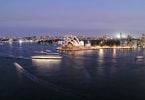BANGKOK — Fears are growing that Thailand’s political crisis could cause lasting damage to its economy and international reputation as the country edges closer to a potentially bloody showdown.
Thai Prime Minister Abhisit Vejjajiva rejected a proposal from antigovernment protesters to dissolve Parliament within 30 days, dashing hopes that a negotiated settlement could be reached soon. Red-shirt-wearing protesters offered the compromise late Friday after grenade attacks brought chaos to one of Bangkok’s main business and tourist zones Thursday night, killing at least one person and injuring more than 85 others. Previously, the protesters had demanded an immediate dissolution.
Thailand’s protesters, who have occupied key parts of Bangkok since March 12, continued to dig in on Sunday, converting a large section of the central city into a fortress surrounded by sharpened bamboo poles, used tires and giant trucks. The government has vowed to clear the area, but when—or how, given that it contains many children and other innocent bystanders—is unclear.
In an interview televised Sunday, Mr. Abhisit said the government was “preparing to be ready for what would lead to the next level,” but didn’t elaborate.
Tensions also flared outside of Bangkok, as more than 1,000 protesters set up roadblocks on a major highway to prevent police reinforcements from reaching the city from the northeast province of Udon Thani, the Associated Press reported. Protesters also set up roadblocks on the outskirts of Bangkok on Sunday to further block police from entering the capital, while demonstrators in the far northeastern province of Nong Kai also tried to block police movements.
Analysts say it is looking increasingly unlikely that the standoff can be resolved without more bloodshed, and some Thais are speaking openly of the possibility of civil war.
The conflict stems in large part from tensions between Thailand’s sizable rural underclass—who make up a majority of voters—and wealthy elites perceived to control the country’s key economic and political institutions.
The Red Shirts are led at least in part by former prime minister Thaksin Shinawatra, a telecommunications tycoon turned politician who built a support base among rural residents through populist policies before he was removed in a 2006 coup. He lives in self-imposed exile to avoid imprisonment on a corruption conviction, but exhorts his followers from overseas.
The protesters want the Oxford-educated Mr. Abhisit, who came to power with military backing in a 2008 parliamentary vote, to call elections, which analysts widely expect Mr. Thaksin’s followers would win. Mr. Abhisit has said he might be willing to call a vote late this year, but doesn’t believe a fair vote is possbile in the current climate.
Thailand’s economy has held up remarkably well despite its many problems in recent years, including a tsunami in 2004 and a multiday shutdown of its international airport in 2008 that stranded more than 200,000 passengers. The country’s economy has done so in large part because of Thailand’s reputation as an accommodating environment for international businesses and tourists, with better infrastructure than its neighbors, an easygoing culture and top beaches.
The current unrest, though, may have a more lasting impact. Unlike past episodes, the latest trouble has brought repeated fighting into tourist areas, especially on April 10, when street battles between Red Shirt protesters and security forces left 25 dead and spread into the Khao San Road area, one of Asia’s most famous backpacker haunts.
Thursday’s grenade attack occurred at a busy train station next to another big tourist draw, the Patpong red-light zone in Bangkok’s financial district. Government officials said the grenades were launched from a Red Shirt-controlled area nearby, but the Red Shirts have denied responsibility.
There is also a growing fear the latest disturbances could become a semipermanent feature of Thailand’s political landscape, given the intractable nature of its conflicts, resulting in repeated outbreaks of urban terrorism. Thursday’s attack was particularly troubling, analysts said, because such incidents in highly trafficked public areas haven’t been common in Bangkok.
“This is not going to go away simply by chasing the Red Shirts out of” the areas they now control, said Paul Quaglia, a director at Bangkok-based security consulting firm PSA Asia. If the protesters are booted out, their unrest will likely become “a bit more underground, and I think it will be a chronic level of violence.”
Government spokesman Panitan Wattanayagorn on Friday afternoon said he agreed Thailand had never seen anything quite like the current unrest, though he laid blame with the Red Shirt movement, which government officials have alleged includes armed terrorists along with some well-meaning activists.
“We’ve never seen an extreme militant wing embedded in political demonstrations like this,” and Thai citizens “don’t know how to react to that,” he said. He said such violence historically occurred only in Thailand’s largely Muslim southern provinces, far from Bangkok, where a separatist movement has resulted in chronic bombings and caused some 4,000 deaths in recent years.
Protest leaders have denied involvement in terror activities and contend they are the victims of government aggression.
Many large foreign companies operating in Thailand, including Ford Motor Co., have reiterated intentions to keep investing there.
“I still remain optimistic we are going to resolve these differences, that a solution will be found,” said William Heinecke, chairman and chief executive of Minor International, a Bangkok company that operates 30 hotels and other retail businesses in Thailand and other countries. They include a Four Seasons hotel, in a Red Shirt-controlled area, that now is closed. On Tuesday, the company said its businesses in other parts of Thailand were still doing well.
Nevertheless, economists generally agree Thailand is likely to lag behind its neighbors as developing Asia recovers from the global financial crisis. Business leaders in Malaysia and Vietnam have been quoted in local media in recent days indicating they believe it will be easier to snatch manufacturing and tourism investments that otherwise would go to Thailand.
Tourism, which accounts for roughly 7% of Thailand’s economy, is perhaps the most vulnerable industry. Hotels in Bangkok are running at roughly 30% occupancy—about half their normal rate—and more permanent damage could follow. On Thursday, the U.S. State Department advised U.S. citizens to avoid all nonessential travel to Bangkok, and several other countries have put out similar warnings.
If the unrest goes on much longer, “it will be difficult for our government to go to other countries all over the world and make them feel comfortable” about coming to Thailand, said Prakit Chinamourphong, head of the Thai Hotels Association. “We hope that everything will calm down very soon.”
Bangkok residents are facing a potential new landscape. In previous bouts of unrest, residents were often able to avoid areas deemed high-risk. But the current instability has been more unpredictable, with roving protests tangling traffic and disrupting business activities across the city, often in unexpected places.
Portions of the city’s public transportation system, including an elevated sky train and subway, have closed with little warning at times over the past month. Many residents are stockpiling food out of fear of extended street battles.
Titiwa Jarusamrit, a 27-year-old clerk at a Bangkok hospital, says she is having trouble getting to work because of shifting transportation schedules, and many market stalls in her neighborhood have closed because they can’t get supplies past the city’s numerous blocked roads.
“My life has been changed,” she said. “It’s difficult to find fresh vegetables—only a few shops are still open in my neighborhood.”
Kanchana Apiphan, a 56-year-old clothing vendor who operates several kiosks in Bangkok’s central business district, said he hadn’t seen anything like the latest violence in 20 years of business. “We have no rule of law anymore.” He added, “I want this situation to finish as soon as possible—I don’t care how the government does it.”
(eTN): Thais fear lasting unrest could do irreparable damage to economy and international reputation | re-post license | post content






















